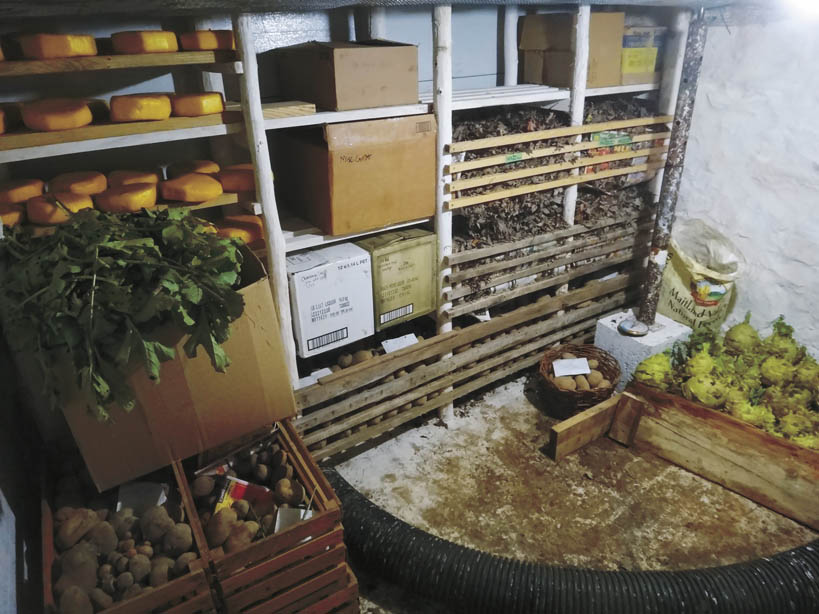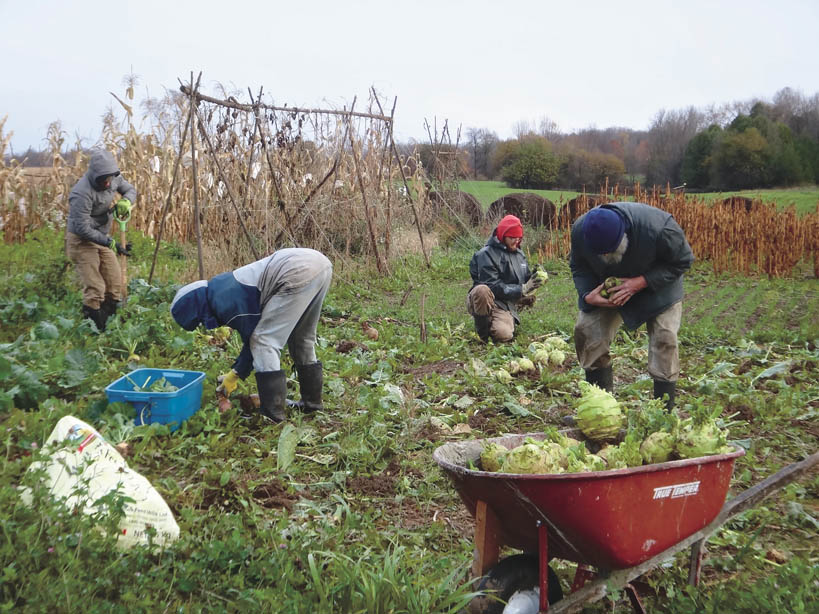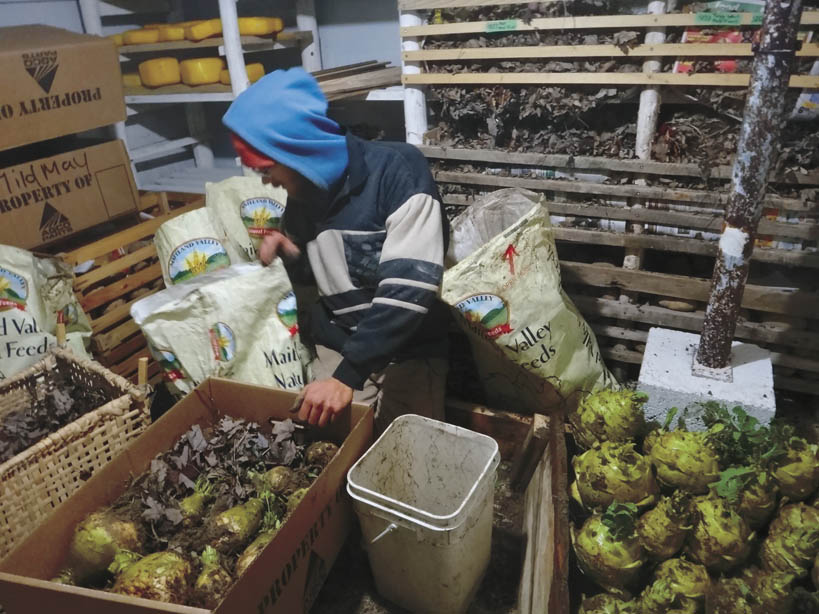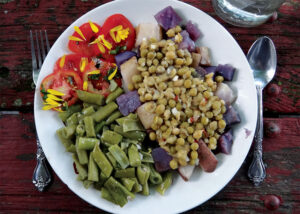Over the past two months, our household has spent a lot of time preparing root crops for storage: digging, trimming the tops and packing them in boxes of dry leaves to go in the cellar. As we’ve worked with the autumnal flood of garlic, onions, potatoes, beets, kohlrabi, turnips, rutabagas, winter radishes, carrots, parsnips, leeks and the erroneously named Jerusalem artichoke, I’ve been considering what I can learn from the relationship between humans and roots.
Working with root crops involves trying to live in harmony with a place and other species. Some roots fulfill special functions in the garden. For example, beets and potatoes help control weeds. We can do less hoeing if we follow them in the garden rotation with crops that struggle more with weedy competition. Radishes and turnips for winter storage can be planted in early August, so we put them where we have just harvested dry peas, filling a space that would otherwise sit neglected for the rest of the season.
Across Canada, root crops are by far the most efficient way to stay supplied with winter vegetables. Importing veggies, growing them in a greenhouse, or canning and freezing summer harvests all use a lot of energy and labour. Roots, by contrast, merely need us to regulate how much winter weather reaches them in a cold, humid storage space. Making roots a central element of our winter diet harmonizes their need to survive and our dietary needs with our region’s climate.
Roots come from several plant families and are remarkably varied in flavour, texture and nutrient value. Most root plants follow a similar, sensible plan to survive the winter. As biennials, their natural pattern is to spend their first year growing and storing food in their roots; then they go dormant for the winter and wake up early in the spring to flower and produce more seed than they could if they’d flowered in their first year.
Humans have developed a mutually beneficial partnership with them based on this rhythm. Our winters are too harsh for them to survive outdoors, so we contrive to make their winter slightly milder. A root cellar is ideal, but people have also stored roots in crawl spaces, under porches, in a mound covered with straw and earth, or in an old, unplugged fridge outside. (Note: garlic and onions are stored cool and dry, not cold and damp.) Since the roots are alive, they fend off spoilage and preserve themselves while waiting for spring. Then we cheat them and eat them.
Inter-species covenant
I used to feel a bit guilty about deceiving my poor innocent roots, but in the last few years I’ve solved that problem in the obvious way: I save their seeds. For me, this work is a fulfillment of our mandate given at the start of Genesis. We acknowledge that humans have a special power to understand what other species need, to alter their environment and to change them by selection—all cases of the sort of vice-regency described in Genesis 1. We also recognize that for us to survive, we must serve them and the ecosystems which support them as described in Genesis 2, creating conditions that allow them to thrive and reproduce. In this way, I see our relationship as a kind of inter-species covenant.
Like any covenant, saving biennial seed involves voluntarily limiting ourselves for the sake of a greater good. We have to exercise restraint and not eat all the food we have grown. Each autumn I sort out our most beautiful roots, pack them in their own special boxes, and tell my family that they must not eat them. I then defend them all winter against family members who don’t read labels carefully.
I am sometimes bothered by sacrificing food for seed production. When this happens, I think about the gardeners before me who made this same sacrifice. I will never know their names or stories, but each carrot I eat is a gift from that long chain of people stretching back to when its species was domesticated millennia ago on the far side of the Earth. It is humbling to join that chain of vital nameless people.
Rooting responsibly
For me, developing this historical sense of my importance and unimportance, and of the inheritance I receive in the foods I eat, has naturally led me to consider what I want to pass on to future people. They won’t remember my name, but whether I intend it or not, my actions will shape their lives in countless ways.
Some things I pass on will enrich their lives and increase the possibilities they have, as mine has been enriched by a gardener choosing to save seed from a particularly cold-tolerant leek, or someone teaching me that kohlrabi makes excellent coleslaw (add lots of parsley!). Other things I pass on, such as radish seed contaminated with a fungal disease, or a changed climate.
Not everyone has to save seed, but we all need to consider what parts of our heritage, both material and cultural, we want to maintain and pass on. As we live and develop that heritage, root vegetables have significant value, because they offer a way to live within the limits imposed by our ecosystems and climate.
Our species doesn’t like limits. However, our Earth is currently warning us that we are endangering ourselves by ignoring various natural limits. We insist on a year-round supply of many varieties of fresh fruits and vegetables. By depending on these foods, we demand long-distance shipping and high-energy storage. Roots, by contrast, are well suited for growing in most of Canada, can be stored with minimal energy inputs, and offer all the vitamins and minerals we seek from more exotic sources.
Choosing to get my vitamin C from turnips instead of oranges is a part of humbly adapting to my region, living up to the legacy I have received, and considering those who will come after me.
How to enhance your relationship with roots
- Eat them. Replace some out-of-season vegetables and fruits with roots. Develop culinary traditions which favour them. Pass on a boxful of root recipes to your grandchildren.
- Store them. Find a place where you can store roots using natural cold and humidity. Acquire roots when they’re harvested and store your own winter supply.
- Grow them. If you have the means, grow some roots! They’re easier than tomatoes.
- Save them. Learn how to save seed for a biennial vegetable. Share your seed with other gardeners.
If you need help with any of these steps, write to me.
Theo Wiederkehr and his family pursue subsistence farming near Mildmay, Ontario. They write for Canadian Mennonite every second month, and can be reached at rumithan@gmail.com.











Leave a Reply
You must be logged in to post a comment.